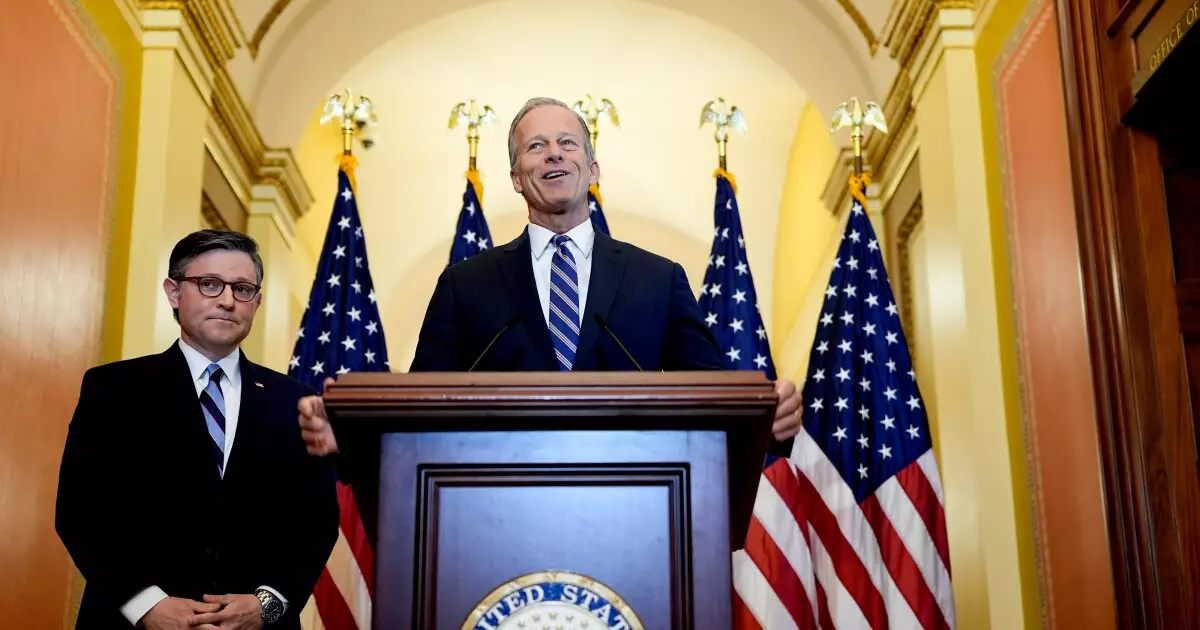In a striking display of partisan tension, President Trump’s much-discussed “big beautiful bill” squeezed through the House of Representatives by a mere two-vote margin. This 216-214 vote may be hailed as a victory for Republican leadership, but it bears within it the seeds of doubt that could unravel its ambitious goals. The critical support garnered by Republican leaders from dissenting factions shows how fragile unity within the GOP remains, which raises questions about future legislation, particularly as deeper spending cuts are still on the table. This lack of consensus, coupled with the emotional rhetoric surrounding the bill, offers a glimpse into a party grappling more with its identity than its objectives.
The Price Tag Dilemma: Balancing Cuts and Tax Reforms
The proposed legislation represents a staggering $5 trillion commitment, but the heart of the issue lies in the $1.5 trillion in spending cuts promised to the ever-cautious House conservatives. Yet, municipal market participants are right to be cautious too, as this anticipated slashing of funds raises concerns about potential assaults on municipal bond tax exemptions. What’s particularly alarming is how lawmakers might navigate the paradox of cutting expenses while simultaneously claiming $4 trillion worth of tax cuts—a maneuver that appears more akin to financial gymnastics than fiscal conservatism. The question becomes apparent: Can a government truly gain without genuinely cutting back, or are we merely rearranging deck chairs on a sinking ship?
The Evolving Narrative: Leadership’s Last-Ditch Persuasion
In the face of disagreement, House Speaker Mike Johnson and his counterpart, Senate Majority Leader John Thune, became the architects of persuasion. Initially, dissenting conservatives voiced their apprehensions about the proposed cuts being insufficient, leading to fears that the current measure would catalyze unsustainable deficits. However, their insistence that the Senate would abide by a similar $1.5 trillion reduction in spending as part of reconciliation negotiations hinted at an attempt to balance immediate dissatisfaction with the promise of future accountability. Yet, this raised the question of how many compromises will have to be made as various interests vie for influence in a future reconciliation bill, and who will ultimately bear the brunt of this fiscal reorganization?
Pandora’s Box: The Consequences of Creative Accounting
The comments from Representatives Thomas Massie and Victoria Spartz provide an ominous outlook for the future of partisan fiscal responsibility. By questioning the methods of accounting, they shine a light on a potential Pandora’s box that legislators are willing to open to conceal reality. Introduced accounting rules that cloak the true financial implications of this bill might avoid immediate scrutiny but will ultimately burden future generations. Such a strategy—while politically expedient in the short run—runs counter to the very principles of transparency and responsibility that fiscal conservatives purport to uphold. Ultimately, these actions evoke a sense of unease, as the implications of concealing budgetary truths may haunt the party and the nation in years to come.
The Senate’s Lack of Ambition: A Call for More
While the House stands resolute in its commitment to cutting $1.5 trillion, the Senate’s reluctance to match this intensity—with only a meager $4 billion in promised cuts—reveals a divergence in ambition and resolve. The Senate’s current policy baseline, which zeroes out the costs of extending the Tax Cuts and Jobs Act (TCJA), demonstrates a reliance on optimistic assumptions that skirt honest financial assessment. In a broader context, this invites skepticism regarding the GOP’s true commitment to fiscal prudence. If a corrective path isn’t pursued with vigor, we risk slipping into the territory of customary government overreach, diluting the essence of what it means to be a fiscal steward in government.
Future Implications for the GOP
The passage of this spending bill may be a fleeting victory for GOP leaders, but its ramifications will echo for years. The struggle within the party reveals a disillusionment with core principles, prompting questions about the sustainability of their conservative base. With rising fears of government spending spiraling increasingly out of control, a reckoning awaits—not just for the leadership but for constituents who may feel abandoned on rising deficits and lost accountability. The path ahead will test whether the party can reaffirm its commitment to true fiscal responsibility and effective governance. The stakes couldn’t be higher.

